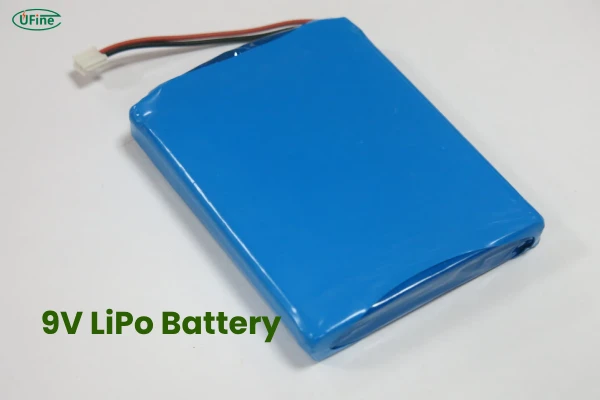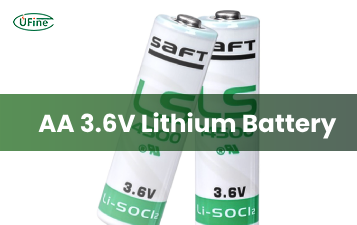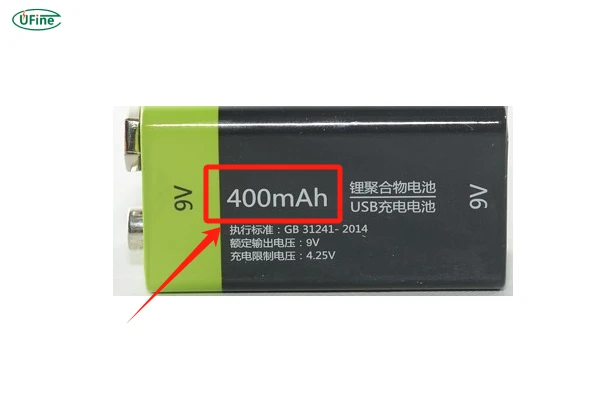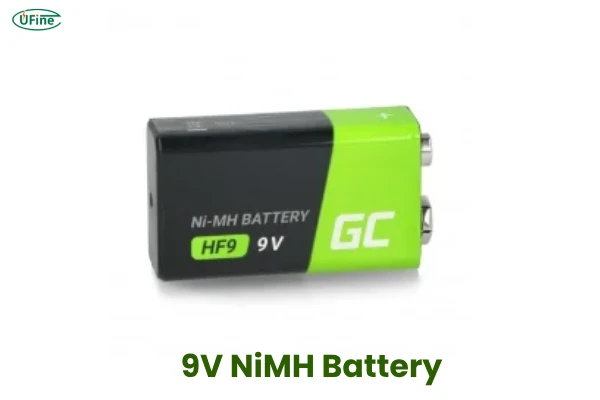Part 1. What is a 9V LiPo battery?

A 9V LiPo battery is a rechargeable power source that uses lithium polymer chemistry. Unlike traditional batteries, a 9V LiPo offers better performance, lighter weight, and longer life.
These batteries are popular replacements for alkaline 9V batteries and even NiMH 9V rechargeable batteries. Why? Because LiPo batteries deliver stable voltage, have a higher energy density, and can be recharged many times—often 500+ cycles.
While an alkaline 9V is disposable and a NiMH 9V is limited by lower capacity, a 9V LiPo battery gives you more consistent power, making it perfect for modern electronics and sensitive gear.
Part 2. Technical specifications of 9V LiPo batteries
Let’s break down what makes the 9V LiPo battery tick.
➤ Voltage
A typical 9V LiPo battery consists of two LiPo cells in series. Each cell has a nominal voltage of 3.7V, giving a total of 7.4V. When fully charged, the battery reaches 8.4V.
To provide a true 9V output, many LiPo batteries include a voltage regulation circuit. This keeps output stable—even as the battery discharges.
Most 9V LiPo batteries offer between 300mAh to 600mAh. The exact capacity depends on the internal design, battery size, and quality.
- Lower mAh (around 300) = smaller size, less runtime.
- Higher mAh (around 600) = longer usage, but usually a bit bulkier.
This rating shows how much energy the battery can store. A higher mAh means more usage time before needing a recharge.
➤ Discharge Rate (C-rating)
The C-rating tells you how fast the battery can release its energy. Devices that draw a lot of power—like wireless microphones or RC cars—need a higher C-rating.
For example, a 2C discharge on a 500mAh battery means it can deliver 1,000mA (or 1A) continuously. Always match the C-rating to your device’s needs.
Part 3. How many mAh is a 9V battery?
Here’s a closer look at how 9V battery capacities compare:
Battery Type Capacity (mAh) Rechargeable? Notes Alkaline 9V 500–600mAh No Voltage drops quickly NiMH 9V 200–300mAh Yes Prone to memory effect LiPo 9V 300–600mAh Yes Stable voltage, longer runtime
While an alkaline 9V may advertise more mAh, it suffers from voltage drop over time. So in real-world use, a 9V LiPo battery often lasts longer and performs better—even if the mAh number is the same or lower.
That’s because of greater efficiency and stable output. So, remember: mAh isn’t everything. Voltage regulation and discharge behavior also matter.
Part 4. 9V rechargeable battery options compared
Let’s compare the three main types of 9V batteries.
1.LiPo (Lithium Polymer)
- Pros: Lightweight, high energy density, long lifespan
- Cons: Needs a special charger, more expensive upfront
- Best for: Pro electronics, sensitive gear, high-drain devices
2. NiMH (Nickel-Metal Hydride)
- Pros: Affordable, rechargeable, easy to find
- Cons: Lower capacity, memory effect, voltage drop
- Best for: Household devices, casual use
3. Alkaline
- Pros: Cheap, easy to buy anywhere
- Cons: Single use, voltage drops fast, wasteful
- Best for: One-time emergency use
If you care about performance, reliability, and saving money long-term, the 9V LiPo battery is the best option.
Part 5. Common uses
Because of their stable voltage and high output, 9V LiPo batteries are used in many important applications:
- Guitar pedals – Musicians need consistent sound quality.
- Smoke detectors – Reliable backup power is critical.
- Wireless microphones – Professional audio gear demands stable current.
- RC toys and drones – Lightweight and high-performance.
- Medical equipment – Vital devices need dependable power.
- Robotics and Arduino projects – Great for makers and engineers.
From fun hobbies to serious safety tools, 9V LiPo batteries power it all.
Part 6. Advantages of 9V LiPo batteries
Why should you choose a 9V LiPo battery?
- Rechargeable: Use it again and again—up to 500+ times.
- Stable Voltage: Keeps your devices running smoothly.
- Compact & Lightweight: Easy to install in small spaces.
- Longer Runtime: Outperforms other types with stable power delivery.
- Eco-Friendly: Less waste than disposable batteries.
Over time, the cost savings and performance add up fast.
Part 7. Disadvantages & safety concerns
But wait—9V LiPo batteries also have some things to watch out for.
- Needs a LiPo charger: You can’t use a regular 9V battery charger.
- Sensitive to overcharging: Overcharging can cause swelling or overheating.
- Lower mAh than some alkalines: But real-world performance is better.
With a bit of care, these risks are easy to manage. Just follow basic LiPo battery safety rules.
Part 8. How to choose the right 9V LiPo battery
Not all 9V LiPo batteries are created equal. Here’s what to check:
Capacity (mAh)
Choose a higher mAh if you want longer usage time. For example, 600mAh will last longer than 350mAh.
Discharge Rate (C-rating)
High-drain devices (like RC cars or transmitters) need higher C-ratings. Low C-ratings may cause poor performance or even damage.
Brand Reputation
Stick with trusted brands. Cheap, no-name batteries might be unsafe and unreliable. Look for UL certification or strong customer reviews.
Part 9. Ufine Battery: your trusted partner in 9V LiPo solutions
If you’re looking for a reliable source of 9V LiPo batteries, look no further than Ufine Battery.
Based in China, Ufine Battery is a professional lithium battery manufacturer offering:
- Custom lithium polymer batteries
- LiFePO4, 18650, and cylindrical batteries
- Ultra-thin, high-rate, and high-temperature solutions
- Fully customizable voltage, size, and capacity for your exact needs
Whether you’re building high-performance gear or need a long-lasting battery for everyday electronics, Ufine Battery has the perfect solution—manufactured to the highest standards.
Need a custom 9V LiPo battery for your application?
Reach out today! Ufine Battery is ready to help you build a power system that fits like a glove.
Contact Ufine Battery Now to discuss your battery needs and receive expert guidance.
Part 10. Charging & maintaining
A little care goes a long way with LiPo batteries.
- Use a balanced LiPo charger: This ensures each cell charges evenly.
- Avoid overcharging: Stop when it hits 8.4V max.
- Store at 3.7V–3.8V per cell: This is ideal for long-term storage.
- Watch for wear: If your battery swells, loses runtime, or gets hot—replace it.
Good habits = longer battery life.
Part 11. Safety tips
LiPo batteries are powerful—but they need respect.
- Never puncture or crush them.
- Don’t expose to heat or direct sunlight.
- Always charge in a safe area—preferably in a LiPo fireproof bag.
- Never leave charging batteries unattended.
- If storing long-term, keep in a cool, dry place.
Use common sense and basic care, and your 9V LiPo battery will serve you well for years.
Part 12. FAQ
Can I charge a 9V LiPo with a normal 9V charger?
No. Only use a LiPo-compatible charger. Regular chargers can damage the battery.
Why does my 9V LiPo only read 7.4V?
That’s normal. Two 3.7V cells = 7.4V nominal. A circuit inside boosts it to a stable 9V output.
Are 9V LiPo batteries safe for smoke detectors?
Yes—if they are from a reliable brand and used with the correct charger.
Do 9V LiPo batteries last longer than alkaline?
Yes, especially over time. They maintain voltage better and can be recharged many times.
Can I travel with a 9V LiPo battery?
Yes. Just pack it properly—most airlines allow small LiPo batteries under 100Wh in carry-on luggage.
Related Tags:
More Articles

What You Need to Know About AA 3.6V Lithium Battery
Learn all about AA 3.6V lithium batteries—voltage, size, capacity, uses, and the best replacements. Discover why they’re powerful, and highly reliable.
What Are Lithium Salts and Why They Matter in Battery Electrolytes
Lithium salts in electrolytes are key to battery performance, powering everything from phones to EVs and shaping the future of clean energy.
Lithium AAA Battery Guide: Power, Performance & Chargers
Explore lithium AAA batteries—voltage, capacity, weight, top brands, and more. Learn how to choose the best battery for your device and why it really matters.
How to Calculate Watts, Volts, and Amps (With Simple Formulas and Examples)
Learn how to calculate watts, volts, and amps for lithium batteries with simple formulas and examples, ideal for EVs, solar, and energy systems.
Comprehensive Analysis of U.S. Tariffs on Chinese Lithium Batteries
U.S. tariffs on Chinese lithium batteries in 2025 impact costs, supply chains, and EV, energy storage, and electronics industries globally.





